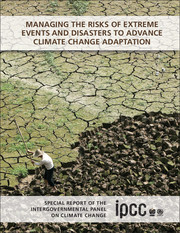 Managing the Risks of Extreme Events and Disasters to Advance Climate Change Adaptation
Managing the Risks of Extreme Events and Disasters to Advance Climate Change Adaptation from Section II
Published online by Cambridge University Press: 05 August 2012
Context
This Summary for Policymakers presents key findings from the Special Report on Managing the Risks of Extreme Events and Disasters to Advance Climate Change Adaptation (SREX). The SREX approaches the topic by assessing the scientific literature on issues that range from the relationship between climate change and extreme weather and climate events (‘climate extremes’) to the implications of these events for society and sustainable development. The assessment concerns the interaction of climatic, environmental, and human factors that can lead to impacts and disasters, options for managing the risks posed by impacts and disasters, and the important role that non-climatic factors play in determining impacts. Box SPM.1 defines concepts central to the SREX.
The character and severity of impacts from climate extremes depend not only on the extremes themselves but also on exposure and vulnerability. In this report, adverse impacts are considered disasters when they produce widespread damage and cause severe alterations in the normal functioning of communities or societies. Climate extremes, exposure, and vulnerability are influenced by a wide range of factors, including anthropogenic climate change, natural climate variability, and socioeconomic development (Figure SPM.1). Disaster risk management and adaptation to climate change focus on reducing exposure and vulnerability and increasing resilience to the potential adverse impacts of climate extremes, even though risks cannot fully be eliminated (Figure SPM.2). Although mitigation of climate change is not the focus of this report, adaptation and mitigation can complement each other and together can significantly reduce the risks of climate change. [SYR AR4, 5.3]
To save this book to your Kindle, first ensure [email protected] is added to your Approved Personal Document E-mail List under your Personal Document Settings on the Manage Your Content and Devices page of your Amazon account. Then enter the ‘name’ part of your Kindle email address below. Find out more about saving to your Kindle.
Note you can select to save to either the @free.kindle.com or @kindle.com variations. ‘@free.kindle.com’ emails are free but can only be saved to your device when it is connected to wi-fi. ‘@kindle.com’ emails can be delivered even when you are not connected to wi-fi, but note that service fees apply.
Find out more about the Kindle Personal Document Service.
To save content items to your account, please confirm that you agree to abide by our usage policies. If this is the first time you use this feature, you will be asked to authorise Cambridge Core to connect with your account. Find out more about saving content to Dropbox.
To save content items to your account, please confirm that you agree to abide by our usage policies. If this is the first time you use this feature, you will be asked to authorise Cambridge Core to connect with your account. Find out more about saving content to Google Drive.